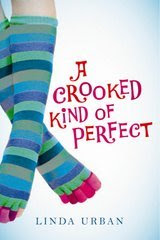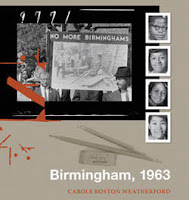My middle school students had a fabulous day with guest author Linda Urban (![]() lurban), talking about A Crooked Kind of Perfect, writing, setting goals, and having the courage to follow dreams. If you ever -- ever -- have an opportunity to host Linda at your school, sign on the dotted line without delay. She's an amazing presenter who left kids laughing as well as feeling inspired and appreciated. I took lots of photos, but I think this one might be my favorite -
lurban), talking about A Crooked Kind of Perfect, writing, setting goals, and having the courage to follow dreams. If you ever -- ever -- have an opportunity to host Linda at your school, sign on the dotted line without delay. She's an amazing presenter who left kids laughing as well as feeling inspired and appreciated. I took lots of photos, but I think this one might be my favorite -
Linda spent our after school period signing books in the school library, answering questions from kids, and listening -- really, really listening -- to their ideas about her book and their own goals and dreams. Thanks, Linda, for a fantastic day!
Tomorrow, I'll be on the other side of the author visit, sharing Spitfire and presenting my Revolution program to middle school kids in Colchester and students in the after-school program in Brandon, Vermont. I'll post on our 18th century adventures later this week!
Viewing: Blog Posts Tagged with: a crooked kind of perfect, Most Recent at Top [Help]
Results 1 - 4 of 4
Blog: Kate's Book Blog (Login to Add to MyJacketFlap)
JacketFlap tags: author visits, linda urban, a crooked kind of perfect, Add a tag
Blog: Four Story Mistake (Login to Add to MyJacketFlap)
JacketFlap tags: librarian, children's books, children's literature, kids' books, coming of age, linda urban, a crooked kind of perfect, piano lessons, juvenile literature, linda urban, piano lessons, juvenile literature, a crooked kind of perfect, kids' books, Add a tag
 A brief history of my reading Linda Urban's A Crooked Kind of Perfect: I had prepared myself not to like the book; I'm not a big fan of drama in kids' literature and the content lent itself to drama (mother works all the time, father has OCD, she's an outcast at school) so I feared that the book would take itself too seriously. But one of my favorite bloggers, ShelfTalker, raved about it so much that I grudgingly checked it out of the library.
A brief history of my reading Linda Urban's A Crooked Kind of Perfect: I had prepared myself not to like the book; I'm not a big fan of drama in kids' literature and the content lent itself to drama (mother works all the time, father has OCD, she's an outcast at school) so I feared that the book would take itself too seriously. But one of my favorite bloggers, ShelfTalker, raved about it so much that I grudgingly checked it out of the library.
Blog: Poetry for Children (Login to Add to MyJacketFlap)
JacketFlap tags: LeeBennettHopkins, Awards, LeeBennettHopkins, Add a tag
 Yesterday, Penn State University announced the 2008 recipients of the Lee Bennett Hopkins Poetry Award.
Yesterday, Penn State University announced the 2008 recipients of the Lee Bennett Hopkins Poetry Award.
Drum roll…
WINNER:
Birmingham, 1963 by Carole Boston Weatherford (Wordsong/Boyds Mills Press)
HONOR BOOKS:
Blue Lipstick: Concrete Poems by John Grandits (Clarion Books)
and
This Is Just To Say; Poems Of Apology And Forgiveness by Joyce Sidman (Hougton Mifflin)
Congratulations all around!
I loved Carole’s true story poem Dear Mr. Rosenwald last year and now she takes a turn to focus spare free verse poetry on the tragic deaths of four young girls in the bombing of the Sixteenth Street Baptist Church in Birmingham, Alabama 45 years ago. Against a graphic background of black and white photographs, this poetic tribute is eloquent and
gut-wrenching.
And what diversity in the honor books, too. I like Blue Lipstick for it's fun experimentation with form and it's angry and angst-filled girl's voice. It has been hugely popular with kids and helps break down boundaries about what poetry "should" look like for young people.
Joyce Sidman’s latest, This Is Just To Say, is a collection of poems of apology and forgiveness in the voices of a classroom of children. It’s funny, poignant, and true, with Sidman’s trademark gift for the craft of poetry in an amazing variety of poetic forms.
The Lee Bennett Hopkins Poetry Award was established in 1993 and is presented annually to an American poet or anthologist for the most outstanding new book of children's poetry published in the previous calendar year. The award is made possible by a gift from Lee Bennett Hopkins himself and is administered by Pennsylvania State University College of Education and the Pennsylvania State University Libraries. Since its inception, the winning poet or anthologist has received a handsome plaque and now a $1000 honorarium made possible by Mr. Hopkins, himself a poet and anthologist.
Based on the award web site, the terms of the award specify that the award shall be granted annually to an anthology of poetry or a single volume poem published for children in the previous calendar year (as per copyright) by a living American poet or anthologist. Their criteria specify that “good poetry is imaginative. It deals with emotion and has significance beyond the act of creation. It uses figurative language, yet is compact in thought and expression. Good poetry has an element of beauty and truth which appears unstable outside of the poem. The book which wins the Lee Bennett Hopkins Award for Children's Poetry must be accessible to children and its presentation must serve the poem or poems in an attractive and appropriate manner.” In recent years, the committee has also cited several honor books each year.
Previous Lee Bennett Hopkins Award Recipients
2006 Jazz by Walter Dean Myers, illustrated by Christopher Myers (Holiday House)
2005 Song of the Water Boatman and Other Pond Poems by Joyce Sidman (Houghton Mifflin)
2004 Here in Harlem by Walter Dean Myers (Holiday House)
2003 The Wishing Bone and Other Poems by Stephen Mitchell (Candlewick)
2002 Splash! Poems of our Watery World by Constance Levy (Orchard)
2001 Pieces: A Year in Poems and Quilts by Anna Grossnickle Hines (Greenwillow)
2000 Light-Gathering Poems by Liz Rosenberg (Henry Holt)
1999 What Have You Lost? by Naomi Shihab Nye (Greenwillow)
1998 The Other Side by Angela Johnson (Orchard)
1997 The Great Frog Race by Kristine O’Connell George (Clarion)
1996 Voices from the Wild by David Bouchard (Chronicle)
1995 Dance with Me by Barbara Esbensen (HarperCollins)
1994 Beast Feast by Douglas Florian (Harcourt)
1993 Spirit Walker by Nancy Wood (Doubleday)
1992 Sing to the Sun by Ashley Bryan (HarperCollins)
FYI: Hopkins also established the Lee Bennett Hopkins Promising Poet Award, presented every three years by the International Reading Association to a new poet with two or fewer poetry books published.
The Poetry Friday Roundup is at Mentor Texts, Read Alouds & More.
Picture credit: http://www.caroleweatherford.com/books.htm
Blog: Poetry for Children (Login to Add to MyJacketFlap)
JacketFlap tags: poetry, LeeBennettHopkins, Add a tag
 Wear something with pockets today, and put some miscellaneous item (like keys, a coin, a paperclip, etc.) in your pocket. Reach into your pocket and slowly bring that item out. Then share the following poem by today’s birthday poet, Lee Bennett Hopkins.
Wear something with pockets today, and put some miscellaneous item (like keys, a coin, a paperclip, etc.) in your pocket. Reach into your pocket and slowly bring that item out. Then share the following poem by today’s birthday poet, Lee Bennett Hopkins.
Treasure
by Lee Bennett Hopkins
A rusty door key,
A part of a tool,
A dead bee I was saving
to take into school;
A crust of pizza,
Sand from the short,
A piece of lead pipe,
An old apple core;
My library card,
A small model rocket—
I guess
it
is
time
to
clean
out
my
pocket.
from Me, Myself, and I (1995)
Invite the children to reach into their pockets, pull out something they can share and tell the story behind it or write a poem about it.
Lee Bennett Hopkins may be the most prolific poetry anthologist of all, with over 100 books of poetry to his credit as both an anthologist and as a writer. Hopkins has also nurtured many new talents in poetry, commissioning up-and-coming poets to write poems for anthologies he compiles.
A few of his most popular titles include Good Books, Good Times (HarperTrophy, 2000), Opening Days: Sports Poems (Harcourt, 1996), School Supplies: A Book of Poems (Simon & Schuster, 1996), My America: A Poetry Atlas of the United States (Simon & Schuster, 2000) and Days to Celebrate: A Full Year of Poetry, People, Holidays, History, Fascinating Facts, and More (HarperCollins, 2005) Teachers and librarians find Hopkins’ work helpful because so many of his anthologies are organized around themes or topics that lend themselves to teaching school subject areas. For example, Hand in Hand: An American History through Poetry (Simon & Schuster, 1994) offers a chronological view of American history through poetry. Or try Hopkins’ collection, Spectacular Science (Simon & Schuster, 1999) which includes science-related poems by writers from Carl Sandburg to Rebecca Kai Dotlich.
Hopkins has also authored biographical and autobiographical writings. Two books about his own life and work include Writing Bug (Richard C. Owens, 1993) and Been To Yesterdays: Poems Of A Life (Wordsong/Boyds Mills Press, 1995) told through poems. Two collections about poets and poetry teaching include Pass the Poetry Please (HarperCollins, 1986) and Pauses; Autobiographical Reflections of 101 Creators of Children’s Books (HarperCollins, 1995).
Called the “The Johnny Appleseed of contemporary children’s poetry,” Lee Bennett Hopkins established two major awards to encourage recognition of poetry for young people: the annual Lee Bennett Hopkins Poetry Award for a single volume of poetry, and the Lee Bennett Hopkins Promising Poet Award, presented every three years by the International Reading Association to a new poet with two or fewer poetry books published. He continues to champion poetry for
One of my favorite Lee-isms is this one: Avoid the “DAM approach” to poetry = Don't force kids to DISSECT, ANALYZE OR MEMORIZE poetry. Not that children aren’t capable of thinking critically or remembering favorites, but our baggage about forcing certain expectations can get in the way of children’s experiences with poetry. Amen!



I am a preschool music teacher and use poetry to help teach rhythm. We are learning ( actually I am asking them to memorize it for our spring program) Lee Bennett Hopkins' Noises. I found your post while searching for info on the poet. Thank you so much.